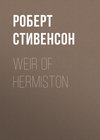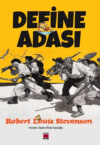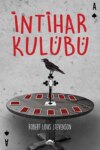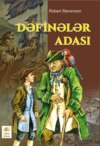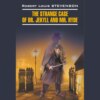Kitabı oku: «Weir of Hermiston», sayfa 5
The third brother had his name on a door-plate, no less, in the city of Glasgow, “Mr. Clement Elliott,” as long as your arm. In his case, that spirit of innovation which had shown itself timidly in the case of Hob by the admission of new manures, and which had run to waste with Gilbert in subversive politics and heretical religions, bore useful fruit in many ingenious mechanical improvements. In boyhood, from his addiction to strange devices of sticks and string, he had been counted the most eccentric of the family. But that was all by now; and he was a partner of his firm, and looked to die a bailie. He too had married, and was rearing a plentiful family in the smoke and din of Glasgow; he was wealthy, and could have bought out his brother, the cock-laird, six times over, it was whispered; and when he slipped away to Cauldstaneslap for a well-earned holiday, which he did as often as he was able, he astonished the neighbours with his broadcloth, his beaver hat, and the ample plies of his neckcloth. Though an eminently solid man at bottom, after the pattern of Hob, he had contracted a certain Glasgow briskness and aplomb which set him off. All the other Elliotts were as lean as a rake, but Clement was laying on fat, and he panted sorely when he must get into his boots. Dand said, chuckling: “Ay, Clem has the elements of a corporation.” “A provost and corporation,” returned Clem. And his readiness was much admired.
The fourth brother, Dand, was a shepherd to his trade, and by starts, when he could bring his mind to it, excelled in the business. Nobody could train a dog like Dandie; nobody, through the peril of great storms in the winter time, could do more gallantly. But if his dexterity were exquisite, his diligence was but fitful; and he served his brother for bed and board, and a trifle of pocket-money when he asked for it. He loved money well enough, knew very well how to spend it, and could make a shrewd bargain when he liked. But he preferred a vague knowledge that he was well to windward to any counted coins in the pocket; he felt himself richer so. Hob would expostulate: “I’m an amature herd.” Dand would reply, “I’ll keep your sheep to you when I’m so minded, but I’ll keep my liberty too. Thir’s no man can coandescend on what I’m worth.” Clein would expound to him the miraculous results of compound interest, and recommend investments. “Ay, man?” Dand would say; “and do you think, if I took Hob’s siller, that I wouldna drink it or wear it on the lassies? And, anyway, my kingdom is no of this world. Either I’m a poet or else I’m nothing.” Clem would remind him of old age. “I’ll die young, like, Robbie Burns,” he would say stoutly. No question but he had a certain accomplishment in minor verse. His “Hermiston Burn,” with its pretty refrain —
“I love to gang thinking whaur ye gang linking,
Hermiston burn, in the howe;”
his “Auld, auld Elliotts, clay-cauld Elliotts, dour, bauld Elliotts of auld,” and his really fascinating piece about the Praying Weaver’s Stone, had gained him in the neighbourhood the reputation, still possible in Scotland, of a local bard; and, though not printed himself, he was recognised by others who were and who had become famous. Walter Scott owed to Dandie the text of the “Raid of Wearie” in the Minstrelsy; and made him welcome at his house, and appreciated his talents, such as they were, with all his usual generosity. The Ettrick Shepherd was his sworn crony; they would meet, drink to excess, roar out their lyrics in each other’s faces, and quarrel and make it up again till bedtime. And besides these recognitions, almost to be called official, Dandie was made welcome for the sake of his gift through the farmhouses of several contiguous dales, and was thus exposed to manifold temptations which he rather sought than fled. He had figured on the stool of repentance, for once fulfilling to the letter the tradition of his hero and model. His humorous verses to Mr. Torrance on that occasion – “Kenspeckle here my lane I stand” – unfortunately too indelicate for further citation, ran through the country like a fiery cross – they were recited, quoted, paraphrased, and laughed over as far away as Dumfries on the one hand and Dunbar on the other.
These four brothers were united by a close bond, the bond of that mutual admiration – or rather mutual hero-worship – which is so strong among the members of secluded families who have much ability and little culture. Even the extremes admired each other. Hob, who had as much poetry as the tongs, professed to find pleasure in Dand’s verses; Clem, who had no more religion than Claverhouse, nourished a heartfelt, at least an open-mouthed, admiration of Gib’s prayers; and Dandie followed with relish the rise of Clem’s fortunes. Indulgence followed hard on the heels of admiration. The laird, Clem, and Dand, who were Tories and patriots of the hottest quality, excused to themselves, with a certain bashfulness, the radical and revolutionary heresies of Gib. By another division of the family, the laird, Clem, and Gib, who were men exactly virtuous, swallowed the dose of Dand’s irregularities as a kind of clog or drawback in the mysterious providence of God affixed to bards, and distinctly probative of poetical genius. To appreciate the simplicity of their mutual admiration it was necessary to hear Clem, arrived upon one of his visits, and dealing in a spirit of continuous irony with the affairs and personalities of that great city of Glasgow where he lived and transacted business. The various personages, ministers of the church, municipal officers, mercantile big-wigs, whom he had occasion to introduce, were all alike denigrated, all served but as reflectors to cast back a flattering side-light on the house of Cauldstaneslap. The Provost, for whom Clem by exception entertained a measure of respect, he would liken to Hob. “He minds me o’ the laird there,” he would say. “He has some of Hob’s grand, whunstane sense, and the same way with him of steiking his mouth when he’s no very pleased.” And Hob, all unconscious, would draw down his upper lip and produce, as if for comparison, the formidable grimace referred to. The unsatisfactory incumbent of St. Enoch’s Kirk was thus briefly dismissed: “If he had but twa fingers o’ Gib’s, he would waken them up.” And Gib, honest man! would look down and secretly smile. Clem was a spy whom they had sent out into the world of men. He had come back with the good news that there was nobody to compare with the Four Black Brothers, no position that they would not adorn, no official that it would not be well they should replace, no interest of mankind, secular or spiritual, which would not immediately bloom under their supervision. The excuse of their folly is in two words: scarce the breadth of a hair divided them from the peasantry. The measure of their sense is this: that these symposia of rustic vanity were kept entirely within the family, like some secret ancestral practice. To the world their serious faces were never deformed by the suspicion of any simper of self-contentment. Yet it was known. “They hae a guid pride o’ themsel’s!” was the word in the country-side.
Lastly, in a Border story, there should be added their “two-names.” Hob was The Laird. “Roy ne puis, prince ne daigne”; he was the laird of Cauldstaneslap – say fifty acres —ipsissimus. Clement was Mr. Elliott, as upon his door-plate, the earlier Dafty having been discarded as no longer applicable, and indeed only a reminder of misjudgment and the imbecility of the public; and the youngest, in honour of his perpetual wanderings, was known by the sobriquet of Randy Dand.
It will be understood that not all this information was communicated by the aunt, who had too much of the family failing herself to appreciate it thoroughly in others. But as time went on, Archie began to observe an omission in the family chronicle.
“Is there not a girl too?” he asked.
“Ay: Kirstie. She was named for me, or my grandmother at least – it’s the same thing,” returned the aunt, and went on again about Dand, whom she secretly preferred by reason of his gallantries.
“But what is your niece like?” said Archie at the next opportunity.
“Her? As black’s your hat! But I dinna suppose she would maybe be what you would ca’ ill-looked a’thegither. Na, she’s a kind of a handsome jaud – a kind o’ gipsy,” said the aunt, who had two sets of scales for men and women – or perhaps it would be more fair to say that she had three, and the third and the most loaded was for girls.
“How comes it that I never see her in church?” said Archie.
“’Deed, and I believe she’s in Glesgie with Clem and his wife. A heap good she’s like to get of it! I dinna say for men folk, but where weemen folk are born, there let them bide. Glory to God, I was never far’er from here than Crossmichael.”
In the meanwhile it began to strike Archie as strange, that while she thus sang the praises of her kinsfolk, and manifestly relished their virtues and (I may say) their vices like a thing creditable to herself, there should appear not the least sign of cordiality between the house of Hermiston and that of Cauldstaneslap. Going to church of a Sunday, as the lady housekeeper stepped with her skirts kilted, three tucks of her white petticoat showing below, and her best India shawl upon her back (if the day were fine) in a pattern of radiant dyes, she would sometimes overtake her relatives preceding her more leisurely in the same direction. Gib of course was absent: by skreigh of day he had been gone to Crossmichael and his fellow-heretics; but the rest of the family would be seen marching in open order: Hob and Dand, stiff-necked, straight-backed six-footers, with severe dark faces, and their plaids about their shoulders; the convoy of children scattering (in a state of high polish) on the wayside, and every now and again collected by the shrill summons of the mother; and the mother herself, by a suggestive circumstance which might have afforded matter of thought to a more experienced observer than Archie, wrapped in a shawl nearly identical with Kirstie’s, but a thought more gaudy and conspicuously newer. At the sight, Kirstie grew more tall – Kirstie showed her classical profile, nose in air and nostril spread, the pure blood came in her cheek evenly in a delicate living pink.
“A braw day to ye, Mistress Elliott,” said she, and hostility and gentility were nicely mingled in her tones. “A fine day, mem,” the laird’s wife would reply with a miraculous curtsey, spreading the while her plumage – setting off, in other words, and with arts unknown to the mere man, the pattern of her India shawl. Behind her, the whole Cauldstaneslap contingent marched in closer order, and with an indescribable air of being in the presence of the foe; and while Dandie saluted his aunt with a certain familiarity as of one who was well in court, Hob marched on in awful immobility. There appeared upon the face of this attitude in the family the consequences of some dreadful feud. Presumably the two women had been principals in the original encounter, and the laird had probably been drawn into the quarrel by the ears, too late to be included in the present skin-deep reconciliation.
“Kirstie,” said Archie one day, “what is this you have against your family?”
“I dinna complean,” said Kirstie, with a flush. “I say naething.”
“I see you do not – not even good-day to your own nephew,” said he.
“I hae naething to be ashamed of,” said she. “I can say the Lord’s prayer with a good grace. If Hob was ill, or in preeson or poverty, I would see to him blithely. But for curtchying and complimenting and colloguing, thank ye kindly!”
Archie had a bit of a smile: he leaned back in his chair. “I think you and Mrs. Robert are not very good friends,” says he slyly, “when you have your India shawls on?”
She looked upon him in silence, with a sparkling eye but an indecipherable expression; and that was all that Archie was ever destined to learn of the battle of the India shawls.
“Do none of them ever come here to see you?” he inquired.
“Mr. Archie,” said she, “I hope that I ken my place better. It would be a queer thing, I think, if I was to clamjamfry up your faither’s house – that I should say it! – wi’ a dirty, black-a-vised clan, no ane o’ them it was worth while to mar soap upon but just mysel’! Na, they’re all damnifeed wi’ the black Ellwalds. I have nae patience wi’ black folk.” Then, with a sudden consciousness of the case of Archie, “No that it maitters for men sae muckle,” she made haste to add, “but there’s naebody can deny that it’s unwomanly. Long hair is the ornament o’ woman ony way; we’ve good warrandise for that – it’s in the Bible – and wha can doubt that the Apostle had some gowden-haired lassie in his mind – Apostle and all, for what was he but just a man like yersel’?”
CHAPTER VI – A LEAF FROM CHRISTINA’S PSALM-BOOK
Archie was sedulous at church. Sunday after Sunday he sat down and stood up with that small company, heard the voice of Mr. Torrance leaping like an ill-played clarionet from key to key, and had an opportunity to study his moth-eaten gown and the black thread mittens that he joined together in prayer, and lifted up with a reverent solemnity in the act of benediction. Hermiston pew was a little square box, dwarfish in proportion with the kirk itself, and enclosing a table not much bigger than a footstool. There sat Archie, an apparent prince, the only undeniable gentleman and the only great heritor in the parish, taking his ease in the only pew, for no other in the kirk had doors. Thence he might command an undisturbed view of that congregation of solid plaided men, strapping wives and daughters, oppressed children, and uneasy sheep-dogs. It was strange how Archie missed the look of race; except the dogs, with their refined foxy faces and inimitably curling tails, there was no one present with the least claim to gentility. The Cauldstaneslap party was scarcely an exception; Dandie perhaps, as he amused himself making verses through the interminable burden of the service, stood out a little by the glow in his eye and a certain superior animation of face and alertness of body; but even Dandie slouched like a rustic. The rest of the congregation, like so many sheep, oppressed him with a sense of hob-nailed routine, day following day – of physical labour in the open air, oatmeal porridge, peas bannock the somnolent fireside in the evening, and the night-long nasal slumbers in a box-bed. Yet he knew many of them to be shrewd and humorous, men of character, notable women, making a bustle in the world and radiating an influence from their low-browed doors. He knew besides they were like other men; below the crust of custom, rapture found a way; he had heard them beat the timbrel before Bacchus – had heard them shout and carouse over their whisky-toddy; and not the most Dutch-bottomed and severe faces among them all, not even the solemn elders themselves, but were capable of singular gambols at the voice of love. Men drawing near to an end of life’s adventurous journey – maids thrilling with fear and curiosity on the threshold of entrance – women who had borne and perhaps buried children, who could remember the clinging of the small dead hands and the patter of the little feet now silent – he marvelled that among all those faces there should be no face of expectation, none that was mobile, none into which the rhythm and poetry of life had entered. “O for a live face,” he thought; and at times he had a memory of Lady Flora; and at times he would study the living gallery before him with despair, and would see himself go on to waste his days in that joyless pastoral place, and death come to him, and his grave be dug under the rowans, and the Spirit of the Earth laugh out in a thunder-peal at the huge fiasco.
On this particular Sunday, there was no doubt but that the spring had come at last. It was warm, with a latent shiver in the air that made the warmth only the more welcome. The shallows of the stream glittered and tinkled among bunches of primrose. Vagrant scents of the earth arrested Archie by the way with moments of ethereal intoxication. The grey Quakerish dale was still only awakened in places and patches from the sobriety of its winter colouring; and he wondered at its beauty; an essential beauty of the old earth it seemed to him, not resident in particulars but breathing to him from the whole. He surprised himself by a sudden impulse to write poetry – he did so sometimes, loose, galloping octo-syllabics in the vein of Scott – and when he had taken his place on a boulder, near some fairy falls and shaded by a whip of a tree that was already radiant with new leaves, it still more surprised him that he should have nothing to write. His heart perhaps beat in time to some vast indwelling rhythm of the universe. By the time he came to a corner of the valley and could see the kirk, he had so lingered by the way that the first psalm was finishing. The nasal psalmody, full of turns and trills and graceless graces, seemed the essential voice of the kirk itself upraised in thanksgiving, “Everything’s alive,” he said; and again cries it aloud, “thank God, everything’s alive!” He lingered yet a while in the kirk-yard. A tuft of primroses was blooming hard by the leg of an old black table tombstone, and he stopped to contemplate the random apologue. They stood forth on the cold earth with a trenchancy of contrast; and he was struck with a sense of incompleteness in the day, the season, and the beauty that surrounded him – the chill there was in the warmth, the gross black clods about the opening primroses, the damp earthy smell that was everywhere intermingled with the scents. The voice of the aged Torrance within rose in an ecstasy. And he wondered if Torrance also felt in his old bones the joyous influence of the spring morning; Torrance, or the shadow of what once was Torrance, that must come so soon to lie outside here in the sun and rain with all his rheumatisms, while a new minister stood in his room and thundered from his own familiar pulpit? The pity of it, and something of the chill of the grave, shook him for a moment as he made haste to enter.
He went up the aisle reverently, and took his place in the pew with lowered eyes, for he feared he had already offended the kind old gentleman in the pulpit, and was sedulous to offend no further. He could not follow the prayer, not even the heads of it. Brightnesses of azure, clouds of fragrance, a tinkle of falling water and singing birds, rose like exhalations from some deeper, aboriginal memory, that was not his, but belonged to the flesh on his bones. His body remembered; and it seemed to him that his body was in no way gross, but ethereal and perishable like a strain of music; and he felt for it an exquisite tenderness as for a child, an innocent, full of beautiful instincts and destined to an early death. And he felt for old Torrance – of the many supplications, of the few days – a pity that was near to tears. The prayer ended. Right over him was a tablet in the wall, the only ornament in the roughly masoned chapel – for it was no more; the tablet commemorated, I was about to say the virtues, but rather the existence of a former Rutherford of Hermiston; and Archie, under that trophy of his long descent and local greatness, leaned back in the pew and contemplated vacancy with the shadow of a smile between playful and sad, that became him strangely. Dandie’s sister, sitting by the side of Clem in her new Glasgow finery, chose that moment to observe the young laird. Aware of the stir of his entrance, the little formalist had kept her eyes fastened and her face prettily composed during the prayer. It was not hypocrisy, there was no one further from a hypocrite. The girl had been taught to behave: to look up, to look down, to look unconscious, to look seriously impressed in church, and in every conjuncture to look her best. That was the game of female life, and she played it frankly. Archie was the one person in church who was of interest, who was somebody new, reputed eccentric, known to be young, and a laird, and still unseen by Christina. Small wonder that, as she stood there in her attitude of pretty decency, her mind should run upon him! If he spared a glance in her direction, he should know she was a well-behaved young lady who had been to Glasgow. In reason he must admire her clothes, and it was possible that he should think her pretty. At that her heart beat the least thing in the world; and she proceeded, by way of a corrective, to call up and dismiss a series of fancied pictures of the young man who should now, by rights, be looking at her. She settled on the plainest of them, – a pink short young man with a dish face and no figure, at whose admiration she could afford to smile; but for all that, the consciousness of his gaze (which was really fixed on Torrance and his mittens) kept her in something of a flutter till the word Amen. Even then, she was far too well-bred to gratify her curiosity with any impatience. She resumed her seat languidly – this was a Glasgow touch – she composed her dress, rearranged her nosegay of primroses, looked first in front, then behind upon the other side, and at last allowed her eyes to move, without hurry, in the direction of the Hermiston pew. For a moment, they were riveted. Next she had plucked her gaze home again like a tame bird who should have meditated flight. Possibilities crowded on her; she hung over the future and grew dizzy; the image of this young man, slim, graceful, dark, with the inscrutable half-smile, attracted and repelled her like a chasm. “I wonder, will I have met my fate?” she thought, and her heart swelled.
Torrance was got some way into his first exposition, positing a deep layer of texts as he went along, laying the foundations of his discourse, which was to deal with a nice point in divinity, before Archie suffered his eyes to wander. They fell first of all on Clem, looking insupportably prosperous, and patronising Torrance with the favour of a modified attention, as of one who was used to better things in Glasgow. Though he had never before set eyes on him, Archie had no difficulty in identifying him, and no hesitation in pronouncing him vulgar, the worst of the family. Clem was leaning lazily forward when Archie first saw him. Presently he leaned nonchalantly back; and that deadly instrument, the maiden, was suddenly unmasked in profile. Though not quite in the front of the fashion (had anybody cared!), certain artful Glasgow mantua-makers, and her own inherent taste, had arrayed her to great advantage. Her accoutrement was, indeed, a cause of heart-burning, and almost of scandal, in that infinitesimal kirk company. Mrs. Hob had said her say at Cauldstaneslap. “Daft-like!” she had pronounced it. “A jaiket that’ll no meet! Whaur’s the sense of a jaiket that’ll no button upon you, if it should come to be weet? What do ye ca’ thir things? Demmy brokens, d’ye say? They’ll be brokens wi’ a vengeance or ye can win back! Weel, I have nae thing to do wi’ it – it’s no good taste.” Clem, whose purse had thus metamorphosed his sister, and who was not insensible to the advertisement, had come to the rescue with a “Hoot, woman! What do you ken of good taste that has never been to the ceety?” And Hob, looking on the girl with pleased smiles, as she timidly displayed her finery in the midst of the dark kitchen, had thus ended the dispute: “The cutty looks weel,” he had said, “and it’s no very like rain. Wear them the day, hizzie; but it’s no a thing to make a practice o’.” In the breasts of her rivals, coming to the kirk very conscious of white under-linen, and their faces splendid with much soap, the sight of the toilet had raised a storm of varying emotion, from the mere unenvious admiration that was expressed in a long-drawn “Eh!” to the angrier feeling that found vent in an emphatic “Set her up!” Her frock was of straw-coloured jaconet muslin, cut low at the bosom and short at the ankle, so as to display her demi-broquins of Regency violet, crossing with many straps upon a yellow cobweb stocking. According to the pretty fashion in which our grandmothers did not hesitate to appear, and our great-aunts went forth armed for the pursuit and capture of our great-uncles, the dress was drawn up so as to mould the contour of both breasts, and in the nook between, a cairngorm brooch maintained it. Here, too, surely in a very enviable position, trembled the nosegay of primroses. She wore on her shoulders – or rather on her back and not her shoulders, which it scarcely passed – a French coat of sarsenet, tied in front with Margate braces, and of the same colour with her violet shoes. About her face clustered a disorder of dark ringlets, a little garland of yellow French roses surmounted her brow, and the whole was crowned by a village hat of chipped straw. Amongst all the rosy and all the weathered faces that surrounded her in church, she glowed like an open flower – girl and raiment, and the cairngorm that caught the daylight and returned it in a fiery flash, and the threads of bronze and gold that played in her hair.
Archie was attracted by the bright thing like a child. He looked at her again and yet again, and their looks crossed. The lip was lifted from her little teeth. He saw the red blood work vividly under her tawny skin. Her eye, which was great as a stag’s, struck and held his gaze. He knew who she must be – Kirstie, she of the harsh diminutive, his housekeeper’s niece, the sister of the rustic prophet, Gib – and he found in her the answer to his wishes.
Christina felt the shock of their encountering glances, and seemed to rise, clothed in smiles, into a region of the vague and bright. But the gratification was not more exquisite than it was brief. She looked away abruptly, and immediately began to blame herself for that abruptness. She knew what she should have done, too late – turned slowly with her nose in the air. And meantime his look was not removed, but continued to play upon her like a battery of cannon constantly aimed, and now seemed to isolate her alone with him, and now seemed to uplift her, as on a pillory, before the congregation. For Archie continued to drink her in with his eyes, even as a wayfarer comes to a well-head on a mountain, and stoops his face, and drinks with thirst unassuageable. In the cleft of her little breasts the fiery eye of the topaz and the pale florets of primrose fascinated him. He saw the breasts heave, and the flowers shake with the heaving, and marvelled what should so much discompose the girl. And Christina was conscious of his gaze – saw it, perhaps, with the dainty plaything of an ear that peeped among her ringlets; she was conscious of changing colour, conscious of her unsteady breath. Like a creature tracked, run down, surrounded, she sought in a dozen ways to give herself a countenance. She used her handkerchief – it was a really fine one – then she desisted in a panic: “He would only think I was too warm.” She took to reading in the metrical psalms, and then remembered it was sermon-time. Last she put a “sugar-bool” in her mouth, and the next moment repented of the step. It was such a homely-like thing! Mr. Archie would never be eating sweeties in kirk; and, with a palpable effort, she swallowed it whole, and her colour flamed high. At this signal of distress Archie awoke to a sense of his ill-behaviour. What had he been doing? He had been exquisitely rude in church to the niece of his housekeeper; he had stared like a lackey and a libertine at a beautiful and modest girl. It was possible, it was even likely, he would be presented to her after service in the kirk-yard, and then how was he to look? And there was no excuse. He had marked the tokens of her shame, of her increasing indignation, and he was such a fool that he had not understood them. Shame bowed him down, and he looked resolutely at Mr. Torrance; who little supposed, good, worthy man, as he continued to expound justification by faith, what was his true business: to play the part of derivative to a pair of children at the old game of falling in love.
Christina was greatly relieved at first. It seemed to her that she was clothed again. She looked back on what had passed. All would have been right if she had not blushed, a silly fool! There was nothing to blush at, if she had taken a sugar-bool. Mrs. MacTaggart, the elder’s wife in St. Enoch’s, took them often. And if he had looked at her, what was more natural than that a young gentleman should look at the best-dressed girl in church? And at the same time, she knew far otherwise, she knew there was nothing casual or ordinary in the look, and valued herself on its memory like a decoration. Well, it was a blessing he had found something else to look at! And presently she began to have other thoughts. It was necessary, she fancied, that she should put herself right by a repetition of the incident, better managed. If the wish was father to the thought, she did not know or she would not recognise it. It was simply as a manœuvre of propriety, as something called for to lessen the significance of what had gone before, that she should a second time meet his eyes, and this time without blushing. And at the memory of the blush, she blushed again, and became one general blush burning from head to foot. Was ever anything so indelicate, so forward, done by a girl before? And here she was, making an exhibition of herself before the congregation about nothing! She stole a glance upon her neighbours, and behold! they were steadily indifferent, and Clem had gone to sleep. And still the one idea was becoming more and more potent with her, that in common prudence she must look again before the service ended. Something of the same sort was going forward in the mind of Archie, as he struggled with the load of penitence. So it chanced that, in the flutter of the moment when the last psalm was given out, and Torrance was reading the verse, and the leaves of every psalm-book in church were rustling under busy fingers, two stealthy glances were sent out like antennæ among the pews and on the indifferent and absorbed occupants, and drew timidly nearer to the straight line between Archie and Christina. They met, they lingered together for the least fraction of time, and that was enough. A charge as of electricity passed through Christina, and behold! the leaf of her psalm-book was torn across.
